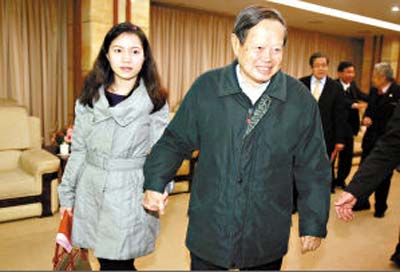Speaking of China's science and technology, Yang commended them for their rapid development.
"Rome was not built in a day; so is the case with science and technology. Advancements, concerning the whole of society, should be driven by both scientists and the public. The Western countries made efforts on this area for centuries. It is hard for China to catch up with them within a couple of decades. But China launched its own satellite when suffering from hardships, which was a great achievement," said Yang.
"As for developments in physics, China is still lagging behind many developed countries," he added, "but the momentum is strong, and I can predict that in one or two decades, there will quite probably be significant findings."
Yang took Tu Youyou, the first Chinese to win the Albert Lasker Award for discovering artemisinin, for example. He pointed out that Chinese scientists had made big breakthroughs, which were, however, unrecognized internationally due to various reasons.
Artemisinin was ignored at the very beginning because Tu did not publish her findings in English, mentioned Yang, adding that collectivism in China in the 1960s and 1970s had forbidden individuals from signing their own names on publications, which made it hard to find the author.
Yang concluded that China's science and technology community is facing two problems, academic cheating and inappropriate allocation of research funds.
"Cheating can be spotted in business circles, universities, and research institutions now. The causes are complicated. I don't think it would prevent China's science and technology from going forward, but I believe cracking down on those misconducts will advance the progress," explained Yang.
"Now China is much richer than before, and there is fierce competition for research funds. The work in this regard can be made better," he continued. "It's a tough task for every country to allocate the funds appropriately. But it is definitely wrong to put the research and development of China's science and technology aside just because of such difficulties."


















